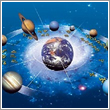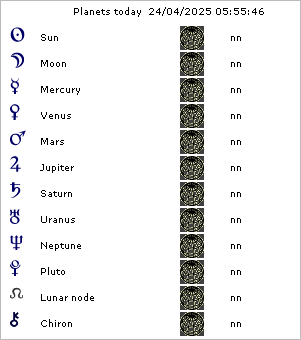|
Venus and Neptune
Edited by Lidia Fassio
It is necessary at this point to be specific, in the sense that these two last archetypes have something to do with the "personal" dimension of the couple, but they symbolise the two last stages of the elevation in which Pluto and Neptune – because I would put them in this order –lead Venus towards the last knowledge potential.
The frontiers of love are eroded by Neptune that will act in a sensational, idyllic way, always through the need for romance and dreaming, bringing together the Neptune need to immerse and getting lost to Venus need to be rewarded and liked. It is an unforgettable love, something sublime and heavenly in which there is a sensation of a real return to t Eden, to that sense of unity in which one’s own identity is not suspended or frightened but is in the hands of someone who seems to be able to manage it and also satisfy it in our place.
We are nevertheless very far from passion: Neptune never aims at anything earthly or even practical, and is mainly far from a traditional couple, which wants to live together in reality and especially in daily routine. Neptune is not real, it is fantastic; and it always hampers seeing what there is beyond the veil which it builds, pushing to find a superior meaning that leads the subject to transcend the ordinary world and to live in a kind of contemplation that drives to completeness rather than in search of a couple.
Love is the tool through whose Neptune insinuates its need of let ourselves go and a sense of separation. Therefore, for Neptune love begins with the need to feel united with something bigger, above all the purpose will be to get this I to reconnect to the If, to the source of original unity from which for so much time it had left on its journey.
In this archetype the loving impulse leads to going beyond all limits and experience makes us live a loss of limits in which the figure of the partner becomes confused into an indistinct one, itself being cancelled before joining that the loss of a sense of division between the subject and the object, and thus trying a sense counter to the lost and constantly regretted original unity. This breaks the rational order of existence and brings us closer near something of superior and infinite: Neptune uses Venus to make us perceive the infiniteness of our being, to make us contact the universal and spiritual dimension and exceed the frontiers of our limited life that binds us in a mediocre and discounted world. Love here leads us to new heights, it makes us perceive openness and access points that were unthinkable. For Neptune love is like an overdose that lets us enter into other states of conscience and knowledge.
Neptune leads us to the essence and to comparison with the choking limits of reality, to reach the possibility of overcoming this; through love it leads to taking us beyond space - time, in a kind of horizontal cancellation of the ego. Neptune leads Venus to the maximum expression of its creative capacities; Venus through Neptune becomes a channel that speaks to all the world through music, dance, art, and empathic and emotional communication: a manner of entering into contact on the one hand with collective unconscious and on the other hand with those who are ready, through t sensitiveness and emotions, to perceive the signals of openness and improvement.
The risk with Neptune is of entering only its lowest dimensions, going down into the realm of dependence – of another or others – that allows us to escape its complete truth. With love it seems to make us pass through a kind of plagiarism in which there is a desire of shaping others or of it being shaped, in a delirium of annulment.
It is a love that can remind us of Pygmalion, that makes his ideal partner, which was absolutely impossible in reality, with clay; Galatea's statue, then asking Aphrodite to give her life: not true life, nevertheless, since he does not respect and does not look for Galatea's individuality, but he wants it in his own image and likeness, exactly as he dreams and wants it; in practical terms he wants her to cancel herself, not to exist with her own identity but in a form that from time to time he chooses for her. This is the “Neptune madness” in which the need of letting go is exchanged for the need of shaping or of cancelling the identity someone else. This love does not go up, does not rise, but it will finish sadly in crossing the line into psychosis in which the need is that of avoiding reality, not of transcending it.
Another dimension of the Neptune madness is sacrificial love, or the idea that for love it is necessary to cancel one’s own will and to offer ourselves as sacrificial victims, in the name or in the hope of a "redemption" that we do not know where it could originate from …
Instead, what Neptune wants to lead us to is the perception of the reflection of Original Unity before conceiving a new dimension of existence that harmonically resounds on the frequencies of the Absolute. The difficulty in understanding this love is in the fact what Neptune does not see and often, behind its fantastic ideas, ideal loves, that are empathic and incredibly illusory, there is nobody: Neptune might fall in love with anything, the other person is only a tool, but in essence does not exist, because Neptune does not let it go beyond the threshold of its cloud and its oblivion. Here love cannot take shape, otherwise it would also lose its strength and reason. Something must remain in the soul, something that cannot and must not be worn-out. Only in this way can it remain “intact and spiritual” and can be fed by the imagination.
Print this article
|
 |
|



